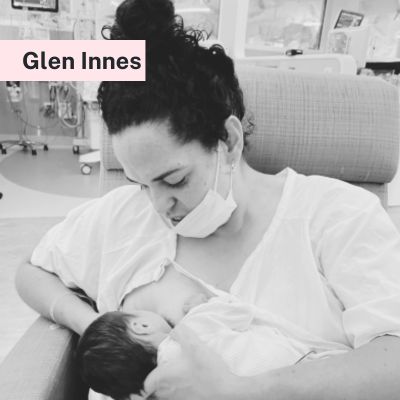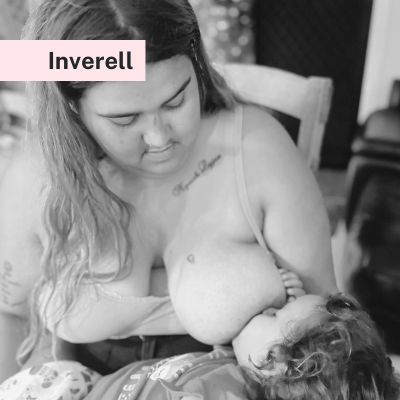The Baby Friendly Initiative Ten Steps to Successful Breastfeeding is the global standard developed by the World Health Organisation to ensure health services comply with an international standard relating to infant feeding and maternity care.
The following is general information for you about breastfeeding. During pregnancy your midwife will be able to discuss most aspects of breastfeeding or may suggest you contact our Breastfeeding Support service for further assistance.
Women tell us that one of the best decisions they made was to attend one of our free Breastfeeding groups. See the program date and time most suited to you.
Download Breastfeeding your Baby Booklet here
Support Services
Hover over the image to see contact details

02 6776 9642
02 6776 9747

02 6739 0226
02 6739 0134

02 6741 8037
02 6721 9600

02 6721 9532
02 6721 9600

02 4921 3970
02 4016 4595
02 4924 2588

02 6721 9532
02 6799 2800

02 4087 2862
02 4087 2862
02 4939 2530

02 6592 9273
0488 307 691
02 6592 9315

02 6757 0051
02 6757 0200

02 6542 2023
02 6542 2050

02 6592 9369
02 6571 9248

02 6540 2152
02 6542 2050

02 6767 7315
0447 759 891
02 6767 8100
Resources
Support for feeding your baby when you go home
Support during 0 to 4 weeks
- Your local Maternity Unit for up to 4 weeks postnatal
- Child and Family Health Nursing Service
- Australian Breastfeeding Association – 1800 686 268
- Raising Children Network
- Attaching your baby at the Breast
- Breastfeeding Support Service - Manning Base Hospital
- Breastfeeding Support Service - John Hunter Hospital
- Breast Engorgement when Breastfeeding/Expressing
- Care of Nipple Shields
- Cleaning and Sterilising Infant feeding Equipment
Support during 4 weeks to 2 years
- Child and Family Health Nursing | HNE Kids
- Australian Breastfeeding Association – 1800 686 268
- Raising Children Network
- Breastfeeding Helpline on 1800 mum 2 mum (1800 686 268)
Benefits of breastfeeding
Benefits of breastfeeding for your baby
Your breastmilk is the perfect food for your baby. It protects your baby against gastroenteritis, ear and chest infections, allergies and diabetes. Breastfeeding has also been shown to promote healthy weight in children. The W.H.O recommends that babies are exclusively breastfed for 6 months and that breastfeeding continues for up to two years after other foods have been introduced.
Benefits of breastfeeding for mothers
Breastfeeding reduces the risk of bleeding after birth, helps you to return to your pre pregnant weight, and is convenient and free. Breastfeeding reduces your risk of breast and ovarian cancer and can help to prevent Type II diabetes in women with pregnancy related diabetes.
Breastfeeding - Rainbow Families
Breastfeeding resources for Aboriginal and Torres Strait mothers
Risks associated with not breastfeeding
Your baby is more likely to get common infectious illnesses such as ear infections and respiratory illnesses. There is an increased risk of your baby developing allergic diseases such as asthma and eczema. There is an increased risk of SIDS especially combined with a parent smoking. Artificial formula is not a sterile product so your baby may develop tummy infections.
Importance of uninterrupted skin-to-skin after birth, feeding cues and the first breastfeed
Holding your baby skin to skin helps you to bond closely with your baby. This is linked to better breastfeeding success and longer BF duration. Skin to skin has been shown to reduce your risk of excessive bleeding after birth. After your baby is born, your baby will begin to show signs of readiness to breastfeed such as licking, sucking, bringing their hand to mouth. These early days when you and your baby will practise good positioning and attachment. This helps to avoid nipple pain, ensures your baby receives enough milk. Most mothers having a caesarean are able to have their baby skin to skin in the operating theatre and/or in recovery.
Getting position and attachment right
It takes time for your baby and you to learn to breastfeed. In the first days after birth your breasts are producing colostrum which is the perfect nutrition for a healthy baby. Your breasts are soft at this stage but begin to feel full as the mature milk ‘comes in’. These early days are when you and your baby will learn together how to attach well to the breast. This helps avoid nipple pain and ensures your baby receives enough breastmilk.
Responsive feeding
Your baby needs to feed frequently in the early days to ensure you have a good milk supply. This should be at least 8 times (or more) in 24 hours while breastfeeding is being established. This is normal and will settle with time.
Rooming-in (keep your baby by your side)
The midwives will assist you to keep your baby in her cot by your bedside. Keeping baby with you helps you to see the cues that your baby displays when they are ready for a feed.
Using teats, dummies and complementary feeds
When baby is learning to breastfeed, they can become confused if offered a teat or dummy before they have learned to breastfeed well. Offering fluids other than breastmilk to a healthy baby will decrease the time your baby breastfeeds, and this will reduce your milk supply. Frequent, unrestricted breastfeeding will satisfy your baby and help you to build a milk supply that is just right for your baby.
For more information on breastfeeding and dummy use follow this link:
Information about giving your breastfed baby extra milk can be found in the below links
Cup-feeding | Australian Breastfeeding Association
Cup Feeding Your Small Baby - Video - Global Health Media Project
Chosen support person for birth
Chosen support person for birth
At HNE health we encourage you to have the support person of your choice with you in labour. Women who are well supported in labour use less medical pain relief which can delay the establishment of breastfeeding.
Comfort measures for labour
There are many things you can do to make labour easier. Non-medical comfort measures can help to avoid medication in labour which may make it harder to establish breastfeeding. Staying active and moving in labour makes contractions more effective and can add to your comfort as can warm showers, warm packs, relaxing, position changes, music and any distraction techniques.
Expressing Breastmilk
Antenatal Breastmilk Expressing
Expressing colostrum before baby is born
How to Express your first milk

